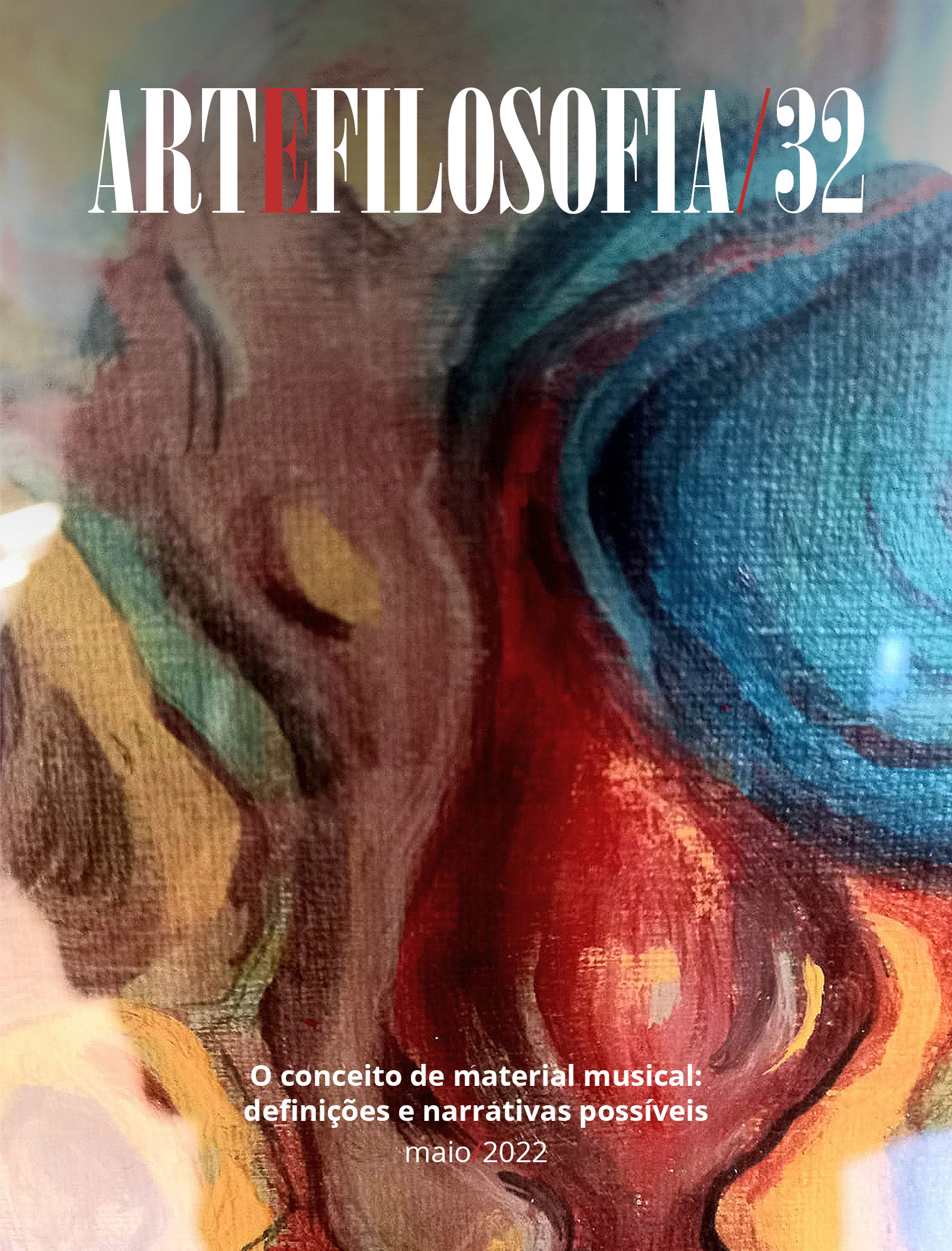“Você não vai tocar o que você praticou… Algo mais vai acontecer”
Abstract
My research focuses mainly on the analysis of improvisation form an action theory perspective, since improvising is an action and interaction process. My contribuition highlights the process of musical improvisation; in order to achieve a more compreensive level I ilustrate my arguments with exemples from standart jazz (an idiomatic genre) and free jazz (a non idiomatic genre). Finally, I propose a model for understanding improvisational action and interaction that is composed of four fundamental dimensions. Together, these explain improvisation and creativity in improvisation processes: 1) the (musical) material, 2) the interaction between the musicians, 3) the attitude of the actors, and 4) the (emergent) music.
Downloads
References
BEHNE, K.-E. “Zur Psychologie der (freien) Improvisation”. In: FÄHNDRICH, W. (Ed.). Improvisation. 10 Beiträge. Winterthur: Amadeus, 1992, pp. 42-62.
BERLINER, P. Thinking in Jazz: the infinite art of improvisation. Chicago, IL: The University of Chicago Press, 1994.
COOK, N. “Making music together, or improvisation and the others”, The Source: Challenging Jazz Criticism, 1, pp. 5-25, 2004.
FERAND, E.. Die Improvisation in Beispielen aus neun Jahrhunderten abendländischer Musik. Colônia: Arno Volk Verlag, 1961a.
FIGUEROA-DREHER, S. K. “Abstimmungsprozesse im Free Jazz: ein Modell des Ordnens” In: BÖHLE, F.; WEIHRICH, M. (Eds.). Die Körperlichkeit sozialen Handelns. Soziale Ordnung jenseits von Normen und Institutionen. Bielefeld: transcript, 2010a, pp. 187-206.
FIGUEROA-DREHER, S. K.. “Material musical como acervo de conocimiento: sujeto, acción e interacción en procesos de improvisación musical”. Civitas. Revista de Ciências Sociais, 11(3), pp. 509-28, 2011.
FIGUEROA-DREHER, S. K. “Was kann die Soziologie vom Free Jazz lernen?”. In: KNAUER, W. (Ed.). Albert Mangelsdorff. Tension/Spannung. Darmstädter Beiträge zur Jazzforschung. vol. 11, Hofheim: Wolke, 2010b, pp. 187-212.
FRISIUS, R. “Improvisation. I. Zur Terminologie”. In: FINSCHER, L. (Ed.) Musik in Geschichte und Gegenwart, Sachteil 4; Kassel: Bärenreiter, 1996, pp. 538-41.
GOULD, C.S.; KEATON, K. “The essential role of improvisation in musical performance”. The Journal of Aesthetics and Art Criticism, 58(2), pp. 143-8, 2000.
HODSON, R. Interaction, Improvisation, and Interplay in Jazz, Nova York: Routledge, 2007.
JOAS, H.. The Creativity of Action. Chicago, IL: University of Chicago Press, 1996.
JOST, E. “Über Jazzimprovisation”. In: BRINKMANN (Ed.). Improvisation und neue Musik. Acht Kongreßreferate, Mainz: Schott, 1979, pp. 55-65.
LEHMANN, A. “Komposition und Improvisation: Generative Musikalische Performanz”. In: STOFFER, T.; OERTER, R. (Eds.). Allgemeine Musikpsychologie, Göttingen: Hogrefe Verlag für Psychologie, 2005, pp. 913-54.
MACKINNON, D. “Creativity I: Psychological aspects”. In: D. MACKINNON, D. (Ed.). International Encyclopedia of Social Sciences, vol. 3, Nova York: MacMillan & Free Press, 1968, pp. 434-42.
MONSON, I.. Saying Something: Jazz improvisation and interaction, Chicago, IL: University of Chicago Press, 1996.
NOLL, D. J. Zur Improvisation im deutschen Free Jazz, Hamburgo: Karl-Dieter Wagner, 1997.
SARATH , E. “A new look at improvisation”. Journal of Music Theory, 40, pp. 1-38, 1996.
SAWYER, K. R. Explaining Creativity: the science of human innovation, Oxford: Oxford University Press, 2006a.
SAWYER, K.R. “Improvisational creativity: An analysis of jazz performance”. Creativity Research Journal, 5(3), pp. 253-63, 1992.
SCHÜTZ, A. “Fragments on the phenomenology of music”. Music and Man, 2, pp. 5-71, 1976.
SCHÜTZ, A.; LUCKMANN, T. The Structures of the Life-World, vol. 1. Evanston, IL: Northwestern University Press, 1973.
WAGNER, M.. “Material”. In: BARCK, K. et al. (Eds.). Ästhetische Grundbegriffe: historisches Wörterbuch in sieben Bänden, vol 3. Stuttgart: Metzler, 2001, pp. 867-82.
Copyright (c) 2022 João Paulo Costa do Nascimento

This work is licensed under a Creative Commons Attribution-NonCommercial-ShareAlike 4.0 International License.
Autores que publicam nesta revista concordam com os seguintes termos:
- Autores/as mantém os direitos autorais e concedem à revista o direito de primeira publicação, com o trabalho simultaneamente licenciado sob a creativecommons.org/licenses/by-nc-sa/4.0/ que permite o compartilhamento do trabalho, com reconhecimento da autoria e publicação inicial nesta revista.
- Autores/as têm autorização para assumir contratos adicionais separadamente, para distribuição não-exclusiva da versão do trabalho publicada nesta revista (ex.: publicar em repositório institucional ou como capítulo de livro), com reconhecimento de autoria e publicação inicial nesta revista.


